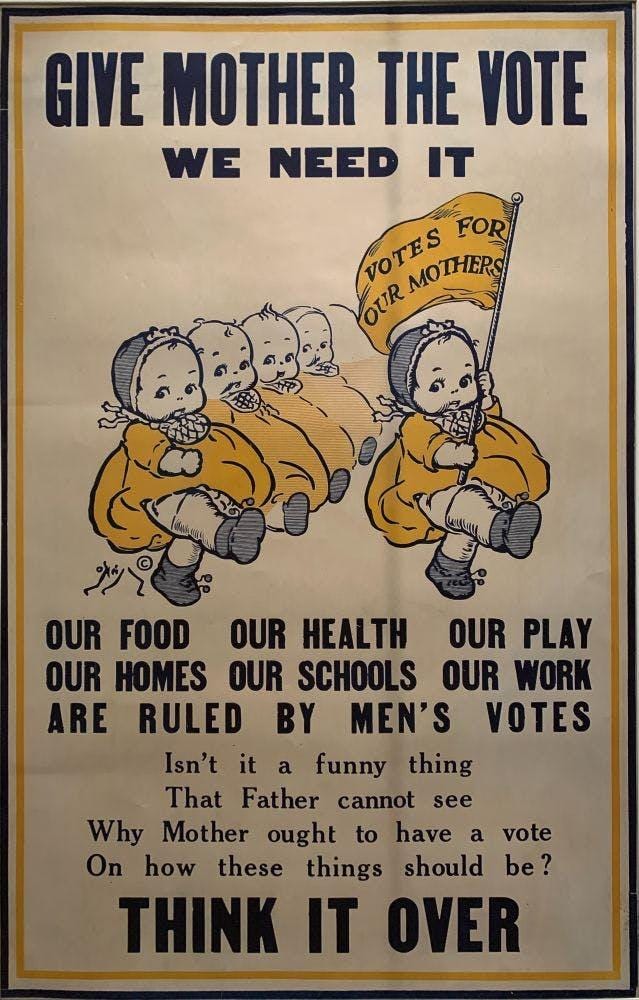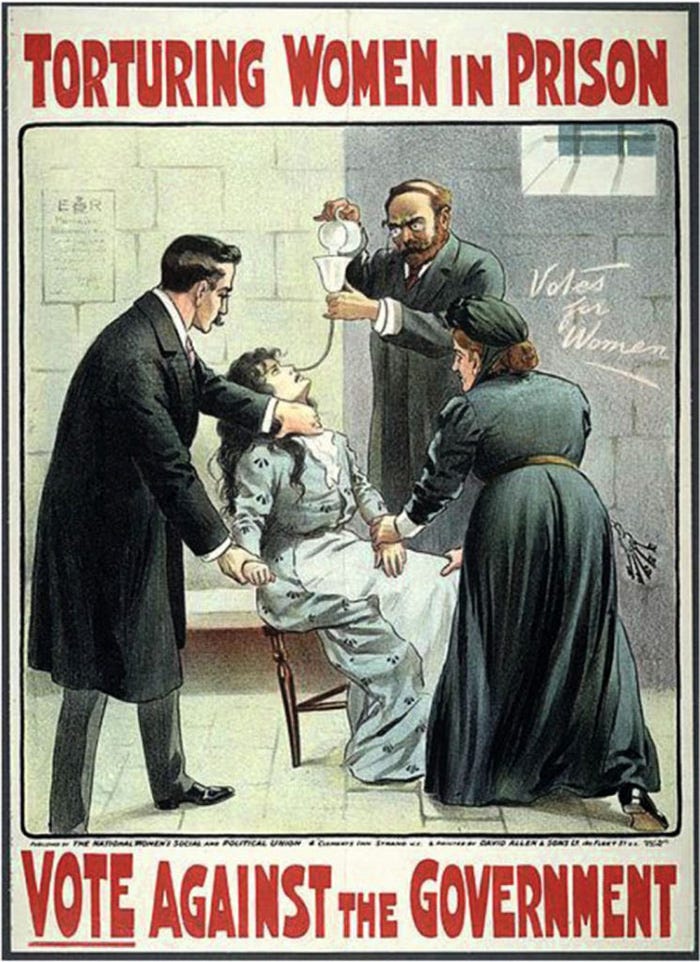Insights About Social Change From A Broadway Musical
"Why are you fighting me? I'm not the enemy."
Hi friends. How is your heart?

Personally it’s been a tough week.
I’ve had a lot of rage, a lot. This New Yorker piece, in which crackerjack interviewer Isaac Chotiner grills an ex-State Department official over Gaza, gave voice to some of that.
And can I just say—I got a chance to talk to some of the World Central Kitchen folks when I was reporting in Ukraine, and learn how wonderful their model is—empowering, leveraging, and paying, local cooks to feed culturally familiar food to people in crises. A new chapter in the world of humanitarian relief, something that knits people together, inherently pluralistic, nimble, decentralized, inclusive, so crucial for a world of accelerating disasters. I’ve been a recurring monthly donor for two years.
They are a moral innovation, a new good thing, which is worth calling out in what seems to be a world of constant new terrible things.
That’s why the killing of 7 of their aid workers by an Israeli army drone strike hurts so badly. Read Jose Andres’ op-ed in the New York Times.
Continuing from my community post from a few weeks ago, I’m thinking lately about how climate action, and action towards a better world more generally, shows up in all of our lives, and particularly the emotional dimensions of that striving.
And I had a wonderful opportunity to contemplate those dynamics last week, when I got a chance to see “Suffs” in previews on Broadway, thanks to feminist journalist, author and connector
.“Suffs” is a historical musical about the women’s suffrage movement. It’s a companion piece in many ways to “Hamilton,” which I personally consider to be the peak of modern musical theater (I’m speaking as a non-die hard musical theater fan, so I most appreciate shows with lots of crossover appeal).
It’s also great, and super educational, for tweens and up.
“Suffs” doesn’t break ground musically in the same way “Hamilton” did, but it tells a story that’s equally important and far less well known. And Shaina Taub pulls a similar artistic feat to Lin-Manuel Miranda: she wrote the book and lyrics, composed the music, and stars as Alice Paul, a Swarthmore grad who was a leader of the movement to pass the 19th Amendment in 1920. It gave me a little subversive thrill to realize that every cast member is a woman or nonbinary.
Stuffed with research, “Suffs” illuminates so many interpersonal tensions for people engaging in social change that really speak to this moment (Mild spoilers follow):
Generational divides
When we open, the National American Woman Suffrage Association (NAWSA) has been plugging along for generations. The Seneca Falls convention was in 1848! This is 1913! The group is campaigning state by state, using classic respectability politics— praising people in power, asking politely, ”give mother the vote.”
Think it over? Screw that!
Alice Paul and her friend Lucy Burns are impatient young firebrands who import militant tactics from England and from other movements like the labor movement. They organize one of the first-ever marches on Washington and ask for a constitutional amendment, not a slow legislative fix.
Be patient, wait your turn vs. We Don’t Have Time: reminds me of the March for Our Lives, Fridays for Future, and so many other movements today.
Show horses vs. workhorses
Paul’s coalition, which strikes out on its own as the National Woman’s Party, drew in women with lots of different skills, loyalties, interests. Inevitably, the best self-marketers and communicators get all the glory and are best remembered by history, like Inez Milholland, a labor lawyer, prison reformer, member of the NAACP, socialist, war correspondent, muse of Carl Sandburg and Edna St. Vincent Millay, Paris fashion plate, and believer in free love, who rode at the head of the suffrage march on the day before Woodrow Wilson’s inauguration on a literal white horse.
In the age of climate “influencers” with millions of followers, whose advocacy is sometimes entirely based on image, this really resonated with me. Inez was amazing! And there are a thousand women whose names we don’t know, standing behind her.
Cracks in the coalition
The women’s suffrage movement, especially this era of it, during America’s “racial nadir,” had a blind spot when it came to race. This may go back to the souring of the long friendship between Susan B. Anthony and Frederick Douglass in the 19th century, when Douglass was convinced to go for Black men’s suffrage first, over that of women.
“Suffs” dramatizes not only how white suffragists battled over the inclusion of Black women in the 1910s, but also the tension between Black women like Mary Church Terrell, leader of the NACW, who picketed the Wilson White House alongside the National Woman’s Party, and Ida B. Wells, the famous anti-lynching muckraker, who was impatient with the racial attitudes of the white suffragists.
Extreme tactics
Paul, Burns, Terrell, and 1000 “Silent Sentinels” picket the Wilson White House for an astonishing eighteen months, well into the First World War. Some are thrown in jail, where they embark on a hunger strike, and are force fed, which amounts to torture.
These tactics are divisive. The suffering they inflict is real. They’re not likely to win friends, but they can influence people.
Sociologist Dana Fisher argues, in her new, excellent book about climate activism Saving Ourselves: From Climate Shocks to Climate Action, that the role of extreme tactics is misunderstood. As she told me for the Hechinger Report:
”It doesn’t draw support for the disruption. It draws support for more moderate parts of the movement. And so it helps to expand the base.”
Burnout
One of the hardest turns of the story emotionally comes from the fact that these women never grant themselves a rest. Maybe that’s why after they win their big victory, the original coalition largely disperses—one woman, the Polish labor organizer Ruza Wenclawksa, goes on to appear in a Eugene O’Neill play on Broadway.
And Alice Paul herself?
She doesn’t marry. And she doesn’t quit. Immediately after they win the vote, she starts campaigning for the Equal Rights Amendment.
Well, the ERA is still unratified. And in post-Dobbs America, with a stubborn pay gap, still no woman president, no real public childcare, no paid family leave, a deeply misogynistic culture in so many ways, the end of the row feels far, far off.
Sometimes, you win someone over
Hands down, the most unbelievable turn of the story is when one of the suffragists, their young scribe, Doris Stevens, starts lobbying one of Woodrow Wilson’s right-hand men, Dudley Malone.
And she actually converts him to their cause! In 1917, he resigns to protest Wilson's failure to support the 19th amendment. Then he serves as the attorney who wins the release of the Silent Sentinels. Then he marries Doris Stevens! It would be far too pat for a musical if it hadn’t actually happened.
…at least for awhile
“Suffs” obviously didn’t have time to include Stevens and Malone’s divorce eight years later, but I kind of love this snark from the New York Times, which calls her and her colleagues “extremist feminists”:
“[Stevens’ divorce] plea was based on the alleged impossibility of two persons of equally strong mind living harmoniously together."
His third bride? “..is described as a very attractive young woman, about 24 years old.” Dudley is 49. Okayyy, Dudley.
The Intimate Pain of the Frenemy
I’ve experienced some anguish recently in conversations—particularly around the war in Gaza—in which me and the person I’m talking with have a lot of shared goals and outlooks, but also some “small” differences that lodge as painfully as splinters.
This happens when we are confronting giant, seemingly-implacable forces and trying to make change. Sometimes it can be easier to direct your ire at the person in front of you, rather than the people to blame.
Rebecca Solnit talks to
in his newsletter about this dynamic this week:“When you actually want to save the world — and I'm using that as a shorthand whether you're doing feminism, climate, some other form of human rights, disarmament, anti-war — to really do the work, you're going to have to talk to people who don't agree with you completely … we're not going to win by standing around and telling everyone else that they're assholes and sellouts and losers and aren't welcome here.”
Taub writes a powerful musical refrain in which two women repeatedly face each other— across racial, generational, strategic, and temperamental divides— and sing, together, in close harmony:
“Why are you fighting me? I’m not the enemy.”
Links
This government memo warned of climate change in 1969
How Native North Americans adapted to the Little Ice Age, a climate crisis, centuries ago.








An excellent post about change makers. Despite the savvy influencers getting all the public attention, there are a lot of solid "work horses" doing a fine job on their little patch, with every bit adding up towards an important shift in public opinion.